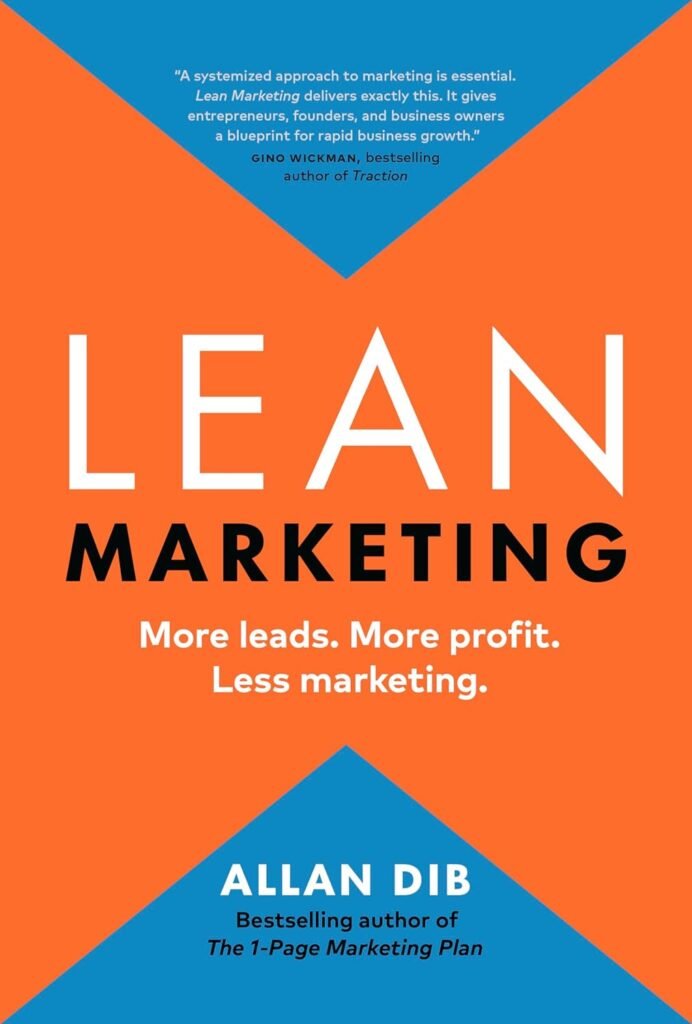Have you ever wondered how you could get more leads and profit by actually doing less? If so, you’re in for a treat with “Lean Marketing: More leads. More profit. Less marketing. (Lean Marketing Series) Kindle Edition.” This unique approach to marketing is not just about cutting down on your efforts but making every action count. Let’s dive into the details and see why this could be the game-changer you’ve been waiting for.

What is Lean Marketing?
Lean Marketing revolves around the concept of maximizing efficiency and effectiveness while minimizing waste. The techniques outlined in “Lean Marketing: More leads. More profit. Less marketing. (Lean Marketing Series) Kindle Edition” are all about streamlining your processes and focusing on what truly matters to drive your business forward.
Efficiency Over Effort
Traditionally, marketing has been a game of large budgets and extensive campaigns. Lean Marketing flips the script by prioritizing smarter, more strategic efforts. You’ll learn how to eliminate unnecessary steps and concentrate on what brings tangible results.
Sustainable Growth
Unlike traditional marketing strategies that may boost short-term gains but fail to sustain growth, Lean Marketing focuses on long-lasting results. The book equips you with tools and techniques aimed at ensuring your business doesn’t just thrive momentarily but enjoys sustained success over time.
Main Themes
Let’s break down some of the main themes covered in the book to get a better understanding of its value.
Customer-Centric Approach
One of the cornerstones is a customer-centric approach. By understanding your customers better, you can tailor your efforts to meet their exact needs, leading to better engagement and higher conversion rates.
Data-Driven Decisions
Gone are the days of guesswork. Lean Marketing emphasizes making decisions based on data. This involves constant measuring, analyzing, and tweaking to get the best possible results without wasting resources.
Continuous Improvement
Lean Marketing encourages a culture of continuous improvement. This is achieved through constant feedback loops, allowing you to fine-tune your strategies consistently.

Key Takeaways
Here are some actionable takeaways from the book that you can start implementing right away.
| Key Takeaway | Description |
|---|---|
| Focus on High-ROI Activities | Identify tasks that bring the most value and allocate your resources there. |
| Eliminate Waste | Cut out any activities or strategies that do not produce measurable results. |
| Test and Iterate | Use small-scale tests to gauge effectiveness before rolling out full-scale campaigns. |
| Prioritize Customer Feedback | Regularly solicit and act on customer feedback to improve your offerings. |
| Leverage Tools | Use technological tools to automate repetitive tasks and free up your time for strategic thinking. |
Focus on High-ROI Activities
By focusing on activities that provide a high return on investment (ROI), you streamline your efforts to only what’s necessary. This approach ensures that your resources are invested where they will generate the most profits.
Eliminate Waste
Identify and eliminate any practices that don’t deliver measurable results. This enables you to channel your energies into more productive activities and ensures that your marketing efforts are efficient.
Test and Iterate
Before going all-in on a major campaign, lean marketing suggests running smaller tests. This helps in pinpointing what works and allows you to make adjustments before committing more resources.
Prioritize Customer Feedback
Engage with your customers regularly and gather their feedback. This valuable information can inform adjustments to your marketing strategies, helping you stay aligned with your audience’s wants and needs.
Leverage Tools
Technological tools can help automate repetitive tasks, giving you more time to focus on strategy and creative thinking. The book covers some of the most effective tools you can utilize to streamline your marketing workflow.
Benefits of Lean Marketing
The benefits of adopting Lean Marketing are far-reaching and can have a significant impact on your business.
Cost Reduction
One of the most immediate benefits is cost reduction. By eliminating unnecessary activities and focusing on high-ROI strategies, you’ll find that your budget goes much further.
Increased Productivity
By streamlining your efforts, you free up time and resources, leading to increased productivity. This allows you to achieve more without needing to expand your team or budget significantly.
Better Customer Relationships
A customer-centric approach naturally leads to better relationships with your audience. By continually adapting to their needs and feedback, you create a loyal customer base that appreciates your efforts.
Sustainable Growth
The importance of sustainable growth cannot be overstated. Lean Marketing ensures that your business growth is not only rapid but also sustained over the long term.
Potential Drawbacks
While Lean Marketing offers many benefits, it’s important to be aware of potential drawbacks.
Initial Learning Curve
Adopting a lean strategy may come with an initial learning curve, particularly if your team is used to traditional marketing methods.
Requires Constant Monitoring
The need for continuous measurement and adjustment means you can’t afford to be complacent. Constant monitoring can be time-consuming initially, although the long-term benefits outweigh this.
Resistance to Change
Your team might resist switching from traditional methods to a lean strategy. It’s essential to get everyone on board and clearly communicate the benefits.
Practical Steps for Implementation
Here are some practical steps you can take to implement Lean Marketing in your business.
Start Small
Begin with small, manageable changes to your marketing strategies. Gradually build on these improvements to avoid overwhelming your team.
Use Analytics
Leverage analytics to understand what’s working and what isn’t. Tools like Google Analytics can provide invaluable insights into your campaigns’ effectiveness.
Regular Team Meetings
Ensure regular team meetings to discuss progress, obstacles, and opportunities for improvement. This keeps everyone aligned and focused on the goals.
Customer Surveys
Implement regular customer surveys to gather feedback and adjust your strategies accordingly. A customer-centric approach is more than just a one-time effort; it’s an ongoing commitment.
Automation Tools
Explore automation tools that can handle repetitive tasks, freeing up your team to focus on strategic efforts. Many tools offer free trials, so you can find one that fits your needs without committing a budget upfront.
Conclusion
“Lean Marketing: More leads. More profit. Less marketing. (Lean Marketing Series) Kindle Edition” provides a comprehensive guide to more efficient, effective, and customer-focused marketing strategies. By focusing on high-ROI activities, eliminating waste, and fostering a culture of continuous improvement, you can achieve sustained growth and better customer relationships. It’s not just about doing less; it’s about doing better with what you have. Implement these strategies, and you’ll likely see a remarkable transformation in your marketing outcomes.
Disclosure: As an Amazon Associate, I earn from qualifying purchases.


